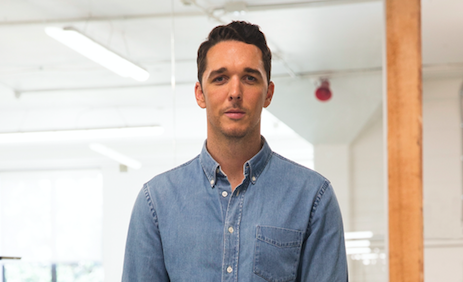Idealog’s Most Creative: Deadly Ponies Liam Bowden talks creativity

What does creativity mean to you?
Creativity to me means, taking a quirk, item or object and expanding it, making it my own interpretation.
What do you think it is about your nature/habits/interests that makes you creative?
I enjoy collecting; the ideas, the concepts and learning. Learning about the process, about creative people and what they make and how they make it. Learning fuels my creativity.
What first drew you to your chosen field?
I sort of fell into it. While studying graphic design I was interested in sculpture and furniture design, which led me into making three-dimensional objects. I started creating furniture, then playing with tactile fabrics, which took me to leather and making leather accessories. Bags came after and here we are today.
What was your upbringing like, and how do you think that led you to where you are today?
As a child, I didn’t bother with many bought toys. My siblings and I would make our own toys out of cardboard, playdough or anything we could get our hands on, which led to me creating something out of nothing.

Where do your best ideas come from?
The best ideas come from refinement – I prefer working and re-working a product until I have discovered a look that meets my expectations. I often don’t know what those expectations are until I get there.
What does inspiration look like for you?
Everything. I am drawn to things that have history and are worn or used. For example, an old padlock or a paintbrush. Figuring out the story behind the item, why it was created or for what purpose and, in turn, how it can be reinterpreted for future projects.
Is there an ethos/motto you abide by in your work?
I try to abide by the rule of having fun and creating products that are not too serious.
If there were a secret to success, what would it be?
Work, work and work. Also, hearing the world around you and taking into consideration what people want and how they respond. It is important to be able to tweak what you are doing to appeal to your target market, however, there is a fine balance in not letting it influence you too much.
What were some of the challenges that you faced early on? What went wrong? Any regrets?
One of my biggest challenges I faced early on was entering the fashion industry with little or no formal training. In terms of the business side, I learnt a lot along the way, which meant a lot of things took longer than they should have.
I have no regrets. These challenges made the products unique and the business operated differently, but we forged our own path.
Creativity to me means, taking a quirk, item or object and expanding it, making it my own interpretation.
Do you work a lot? Do you have an obsessive part to your personality?
I do not see Deadly Ponies as work. I am always curious and continually researching an object or an artwork. It may seem a little obsessive. Currently, I am researching everything about nut-crackers; the history, function, models, style – everything!

What’s the secret to resilience?
The secret to resilience is being able to take things seriously, but to always prioritise having fun.
What have been some of the highlights of your career?
Opening our first store remains one of the many highlights in my career and then the subsequent stores after that. Other highlights include staff events and team breakfasts; seeing the whole team we’ve brought together – all these people are working towards one goal – it is very humbling.
What do you think New Zealand is like for creativity? Is there something about ‘Kiwiness’ that helps or hinders?
I believe creativity thrives in New Zealand because we are small country. There are many cottage industries and specialist creators who can be a lot more accessible and we can give things a go or know someone who can help.
What would be the advice you’d give someone who wants to turn their creative passion into a full-time gig?
My advice would be that knowledge is powerful. Learn as much as you can about your passion and continue to seek out others more skilled to learn from.
What have been the biggest lessons you’ve learned?
To learn to categorise problems and don’t sweat the small stuff.
Where to next? Do you have a goal you’re working towards?
2017 was a big year for us and at times there was not enough time to reflect on what we had achieved. Next year we have a number of exciting projects in the pipeline, however we will also take stock and focus on our processes and refinement.




